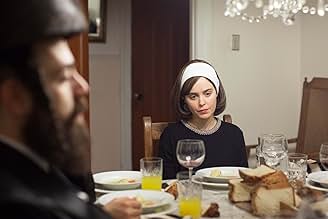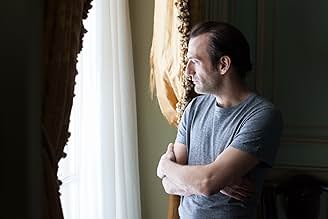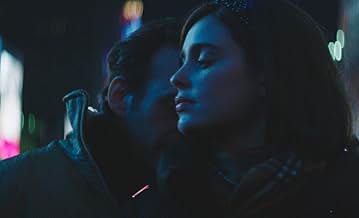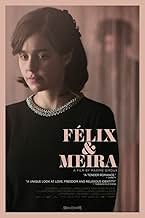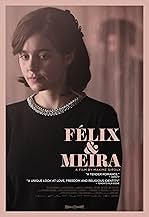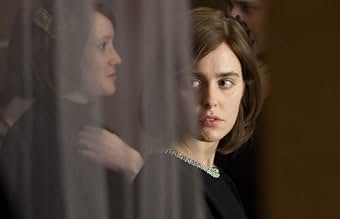IMDb RATING
6.7/10
1.7K
YOUR RATING
In Félix and Meira, an unusual romance blossoms between two lost souls who inhabit the same neighborhood but vastly different worlds.In Félix and Meira, an unusual romance blossoms between two lost souls who inhabit the same neighborhood but vastly different worlds.In Félix and Meira, an unusual romance blossoms between two lost souls who inhabit the same neighborhood but vastly different worlds.
- Director
- Writers
- Stars
- Awards
- 15 wins & 14 nominations total
- Director
- Writers
- All cast & crew
- Production, box office & more at IMDbPro
Featured reviews
10ageyagey
It is always good to be able to define yourself. Even if traditions contradict your mind. In this film I saw the case when traditions are evil that rules over weak people. ....and love is not a tradition, it is a decision, not possible without knowing yourself. I like enormously the film, three main actors played excellent. What impressed me a lot were two sequences: the first one - the conversation between а "tradition man" Luzer Twersky and а "non tradition man" Martin Dubreuil; and the second one - when a "tradition man" broke his tradition listening to the song "After Laughter "after his wife left him.
The story makes sense and is slowly unraveling in a way for us to gather the feelings. A bit like real life can be slow. Real life slow feels less slow than films though. But the films goes its way and we finally arrive somewhere slow and boring but a notch more free. Praise the lord!
Felix and Meria begins with a traditional Hasidic Jewish dinner: singing, celebration and religious clothing. Everyone seems comfortable except for Meria, our protagonist, and immediately through visuals we sense that something does not sit well with her. Thus begins the major conflict of the film as Meria debates internally her commitment to tradition.
Because of the timeless nature of this culture, at the beginning it is deliberately unclear what time period the film takes place in. Meria is scolded by her extremely traditional husband for playing LP records, indicating the film is a period piece. Yet as the film goes on and Meria slowly ventures outside of her Hasidic bubble, we realize that the film does in fact take place in present day, yet we discover it through her eyes and slowly it becomes more modern. The visual palette (like a love child of last year's Ida and A Most Violent Year) distinctly drives Meria's journey. This makes the modern world look in a distinct way unlike anything I have ever seen in a movie.
While focusing on Meria and her doubts in her beliefs, it quick develops into a love story. Despite being married and living among the traditional culture, Meria falls for Felix, a bachelor without the same family values. This isn't the adulterous kind of romance - everything is subdued, making even holding hands feel like a display of passion. The suspense remains because of how forbidden the relationship is in the first place, and thanks to top-tier performances and direction, the relationship between protagonists never feels inauthentic.
The dramatic sequences scattered throughout the film significantly outweigh the overall narrative. The symbols are rich without being overt. As said above, this is a movie full of subtlety that matches the emotional tone of the characters. The only not subtle moment happens right after Felix and Meria first spend time together, when the film transitions to an isolated clip seemingly unrelated yet emotionally moving. I would have been happy to see more of these, but alas because it only happened once it draws more power to itself.
As stated above the primary conflict of the film is tradition vs. love, which is incredibly powerful yet not as universal in today's world. Unfortunately, Meria's husband is reduced to being a caricature and not given enough complexity as a character. Had he been more layered, it would increase the stakes in how difficult it would be for Meria to decide to stray away from him. Regardless, this is the romantic drama that people should yearn for. Most romance audience prefer the more saccharine Nicholas Sparks adaptations, but could truly enjoy seeing something much more subtle and powerful as seen in Felix and Meria.
Because of the timeless nature of this culture, at the beginning it is deliberately unclear what time period the film takes place in. Meria is scolded by her extremely traditional husband for playing LP records, indicating the film is a period piece. Yet as the film goes on and Meria slowly ventures outside of her Hasidic bubble, we realize that the film does in fact take place in present day, yet we discover it through her eyes and slowly it becomes more modern. The visual palette (like a love child of last year's Ida and A Most Violent Year) distinctly drives Meria's journey. This makes the modern world look in a distinct way unlike anything I have ever seen in a movie.
While focusing on Meria and her doubts in her beliefs, it quick develops into a love story. Despite being married and living among the traditional culture, Meria falls for Felix, a bachelor without the same family values. This isn't the adulterous kind of romance - everything is subdued, making even holding hands feel like a display of passion. The suspense remains because of how forbidden the relationship is in the first place, and thanks to top-tier performances and direction, the relationship between protagonists never feels inauthentic.
The dramatic sequences scattered throughout the film significantly outweigh the overall narrative. The symbols are rich without being overt. As said above, this is a movie full of subtlety that matches the emotional tone of the characters. The only not subtle moment happens right after Felix and Meria first spend time together, when the film transitions to an isolated clip seemingly unrelated yet emotionally moving. I would have been happy to see more of these, but alas because it only happened once it draws more power to itself.
As stated above the primary conflict of the film is tradition vs. love, which is incredibly powerful yet not as universal in today's world. Unfortunately, Meria's husband is reduced to being a caricature and not given enough complexity as a character. Had he been more layered, it would increase the stakes in how difficult it would be for Meria to decide to stray away from him. Regardless, this is the romantic drama that people should yearn for. Most romance audience prefer the more saccharine Nicholas Sparks adaptations, but could truly enjoy seeing something much more subtle and powerful as seen in Felix and Meria.
Greetings again from the darkness. This movie is filled with quiet and stillness. Maybe moreso than any movie I can recall. With a backdrop of Montreal, New York and Venice, and a theme of forbidden love and self-discovery, the quiet of the actors belie the undercurrent of emotion driving the three leads.
Meira (Hadas Yaron) is a Hasidic Jew living with her husband Shulem (Luzer Twersky) and their toddler daughter within an Orthodox community where women are forbidden from listening to "outside" music, creating art, or even looking men directly in the eye. Their mission in life is to serve their husband, have lots of babies, and respect the religion. While many women in the community seem fine with their lot, Meira hides records under the sofa, draws pictures in a pocket-sized notebook, and longs for the excitement and color of the real world.
One day, by happenstance, the paths of Meira and Felix (Martin Dubreuil) cross in a neighborhood corner store. He compliments her on her drawing, as she tries to ignore him. By the time they next meet, we have witnessed the painful bedside farewell of Felix to his dying father. It's difficult to tell which is the stronger emotion here – guilt or grief.
Soon enough Felix and Meira are finding ways to meet, but there is no crazed display of passion between the two. There is a devastating scene as Felix patiently waits while Meira musters the courage to actually look into his eyes. It's like 50 Shades of Restraint. It turns out, for different reasons, these two lost souls share a common bond of loneliness. Meira's individuality and creativity are stifled by religious oppression, while Felix is coming to grips as the black sheep of a family that no longer exists. When Felix says of his father, "He hated me to death. And then he died.", we understand it's the missed opportunity that weighs on him more than the passing of a long-lost parent.
Music plays a vital role in how director Maxine Giroux presents the characters and the story. Wendy Rene's "After Laughter Comes the Tears" is used beautifully, as is Leonard Cohen's "Famous Blue Raincoat". Heck, even a mousetrap becomes music to the desperate ears of Meira. As stated before, the film is incredibly quiet, and I challenge any movie lover to come up with a more painful argument than the one featuring Meira and Shulem whispering at each other from separate beds, or a more powerful scene with fewer spoken words than Shulem and Felix at the kitchen table. On the bright side, watching her walk around in her first ever pair of jeans is a freeing sight to behold.
Mr. Giroux presents something very real, yet outside the bounds of what cinema usually brings when forbidden love, religion, loneliness and grief are involved. Ms. Yaron delivers an astounding performance, and it's little wonder this has been such a hit on the festival circuit.
Meira (Hadas Yaron) is a Hasidic Jew living with her husband Shulem (Luzer Twersky) and their toddler daughter within an Orthodox community where women are forbidden from listening to "outside" music, creating art, or even looking men directly in the eye. Their mission in life is to serve their husband, have lots of babies, and respect the religion. While many women in the community seem fine with their lot, Meira hides records under the sofa, draws pictures in a pocket-sized notebook, and longs for the excitement and color of the real world.
One day, by happenstance, the paths of Meira and Felix (Martin Dubreuil) cross in a neighborhood corner store. He compliments her on her drawing, as she tries to ignore him. By the time they next meet, we have witnessed the painful bedside farewell of Felix to his dying father. It's difficult to tell which is the stronger emotion here – guilt or grief.
Soon enough Felix and Meira are finding ways to meet, but there is no crazed display of passion between the two. There is a devastating scene as Felix patiently waits while Meira musters the courage to actually look into his eyes. It's like 50 Shades of Restraint. It turns out, for different reasons, these two lost souls share a common bond of loneliness. Meira's individuality and creativity are stifled by religious oppression, while Felix is coming to grips as the black sheep of a family that no longer exists. When Felix says of his father, "He hated me to death. And then he died.", we understand it's the missed opportunity that weighs on him more than the passing of a long-lost parent.
Music plays a vital role in how director Maxine Giroux presents the characters and the story. Wendy Rene's "After Laughter Comes the Tears" is used beautifully, as is Leonard Cohen's "Famous Blue Raincoat". Heck, even a mousetrap becomes music to the desperate ears of Meira. As stated before, the film is incredibly quiet, and I challenge any movie lover to come up with a more painful argument than the one featuring Meira and Shulem whispering at each other from separate beds, or a more powerful scene with fewer spoken words than Shulem and Felix at the kitchen table. On the bright side, watching her walk around in her first ever pair of jeans is a freeing sight to behold.
Mr. Giroux presents something very real, yet outside the bounds of what cinema usually brings when forbidden love, religion, loneliness and grief are involved. Ms. Yaron delivers an astounding performance, and it's little wonder this has been such a hit on the festival circuit.
This film is about the explicit values of two adjacent cultures who live on different sides of a railroad, each reaching for something more
the unknown. For Felix and Meira, the unknown becomes uncertainty. Life and lifestyles are disrupted, communities clash, and traditions unsaddled.
This isn't a story of skinheads, hippies, Trekkies, or of Generations X, Y, or Zeds. It is of a girl called Meira and French Felix, each who adopt their known cultural traits. Her identity is repressed, arrested by secret Hasidic customs and protocol where women are quieted and obedient. Apparently of the Satmar tribe, women wear wigs and are in arranged marriages. Felix flits in and out of his family, daring to explore the matrix of love. Meira too openly resists the known in favour of love, romantic love. However, romantic love is not reality.
Viewers experience subconscious moments acknowledging resistance to our ostensibly defined lives. Each of us wanting to explore outside known cultural norms. Some may call it slow moving, I call it pace. We aren't rushed through every scene, but given permission to decode the mysteries of the Hasidim. What is uncovered, I cannot tell. What is revealed, is how the unknown can be even more uncertain than what we know.
This isn't a story of skinheads, hippies, Trekkies, or of Generations X, Y, or Zeds. It is of a girl called Meira and French Felix, each who adopt their known cultural traits. Her identity is repressed, arrested by secret Hasidic customs and protocol where women are quieted and obedient. Apparently of the Satmar tribe, women wear wigs and are in arranged marriages. Felix flits in and out of his family, daring to explore the matrix of love. Meira too openly resists the known in favour of love, romantic love. However, romantic love is not reality.
Viewers experience subconscious moments acknowledging resistance to our ostensibly defined lives. Each of us wanting to explore outside known cultural norms. Some may call it slow moving, I call it pace. We aren't rushed through every scene, but given permission to decode the mysteries of the Hasidim. What is uncovered, I cannot tell. What is revealed, is how the unknown can be even more uncertain than what we know.
Did you know
- TriviaLuzer Twersky and Melissa Weisz, who play Shulem, the husband, and Ruth, the friend Meira confides in about not wanting to have more children, both are former Hasidic Jews who left the community as young adults. Twersky assisted in translating the script into Yiddish and served as a technical adviser regarding pronunciation, costumes, meals, and the Jewish rituals depicted in the movie.
- GoofsWhen Shulem hits Félix, you can see Meira in the background trying not to giggle. Considering the tensity of the scene and the nature of Meira's character, it's very likely this was unintentional and a break in character.
- ConnectionsFeatured in 2016 Canadian Screen Awards (2016)
Details
- Release date
- Country of origin
- Official site
- Languages
- Also known as
- Felix and Meira
- Filming locations
- Production companies
- See more company credits at IMDbPro
Box office
- Gross US & Canada
- $447,353
- Opening weekend US & Canada
- $15,000
- Apr 19, 2015
- Gross worldwide
- $496,714
- Runtime
- 1h 45m(105 min)
- Color
- Sound mix
- Aspect ratio
- 2.35 : 1
Contribute to this page
Suggest an edit or add missing content





